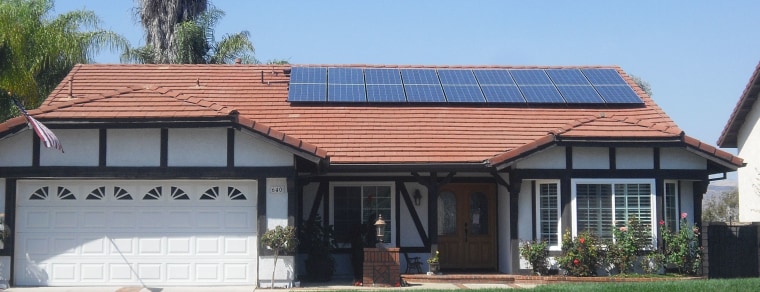Coming soon to a home near you: Solar panels owned by Google. That's right, the software giant announced Tuesday that it's investing $75 million to get more homeowners hooked up to the sun for their electricity.
Over the years, Google has invested $850 million in renewable energy, including $280 million in a solar financing project last June, but this is the first time it will actually own the hardware — from the photovoltaic cells on rooftops to the power inverters in basements and garages.
"They own 100 percent of the asset," says Nat Kreamer, chief executive officer of Clean Power Finance, a company based in San Francisco and Google's partner in the new venture.
But don't expect Google logos on rooftops across America. "There's no Google branding on the panels," says Whitney Phaneuf, a spokesperson for Clean Power Finance. "Google doesn't want to be a utility."
What Google will do is provide the financing so 3,000 homes can get hooked up, at no out-of pocket cost, to a system that typically runs between $30,000 and $40,000. Local installers will do the work, and then homeowners will pay a fixed, monthly rate for their electricity. All maintenance is covered by the rate.
"We're really helping homeowners refinance their electricity bills," says Phaneuf.
Since the contracts are typically for 20 years, Google gets a steady flow of revenue via Clean Power Finance, as well as the benefit of federal and state renewable energy subsidies.
"Cash sales (of solar panels) have been good, but once you add financing, sales can go through the roof," said Rick Needham, Google's director of green business operations. "It's an opportunity to significantly expand the market."
"We think it makes a lot of sense to use solar photovoltaic (PV) technology — rooftop solar panels — to generate electricity right where you need it at home," Needham added in a blogpost Tuesday. "It greens our energy mix by using existing roof space while avoiding transmission constraints, and it can be cheaper than drawing electricity from the traditional grid."
Google didn't disclose what kind of return on investment it expects, but Clean Power Finance says others who have provided similar financing have made money.
"Absolutely, it's an investment targeted at making money," says Kreamer.
Investors get "a hassle-free way to manage their investment" since Clean Power Finance and installers do the leg work, he adds.
Moreover, the risk is low since solar customers tend to have good credit and pay their electricity bills. That makes for a "higher than expected return" compared to say what one would get by buying a bond from a utility, which has to deal with customers with bad credit.
Kreamer acknowledges that solar doesn't make economic sense in every home, hence the project's launch in just three sunny markets to start: California, Colorado and Arizona.
But, he adds, "one third of all Americans are in markets where they can save money" by going solar. "If you're in one of those markets you can save 10 percent or more without putting any money down."
